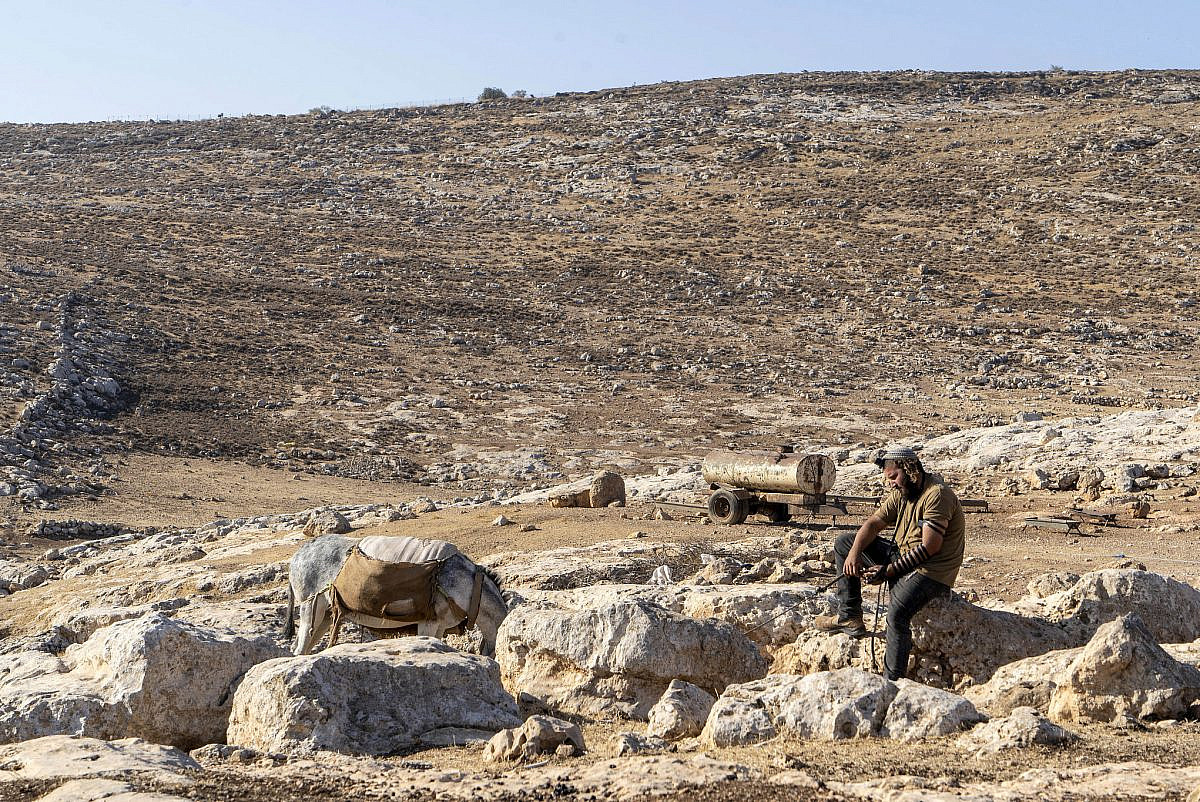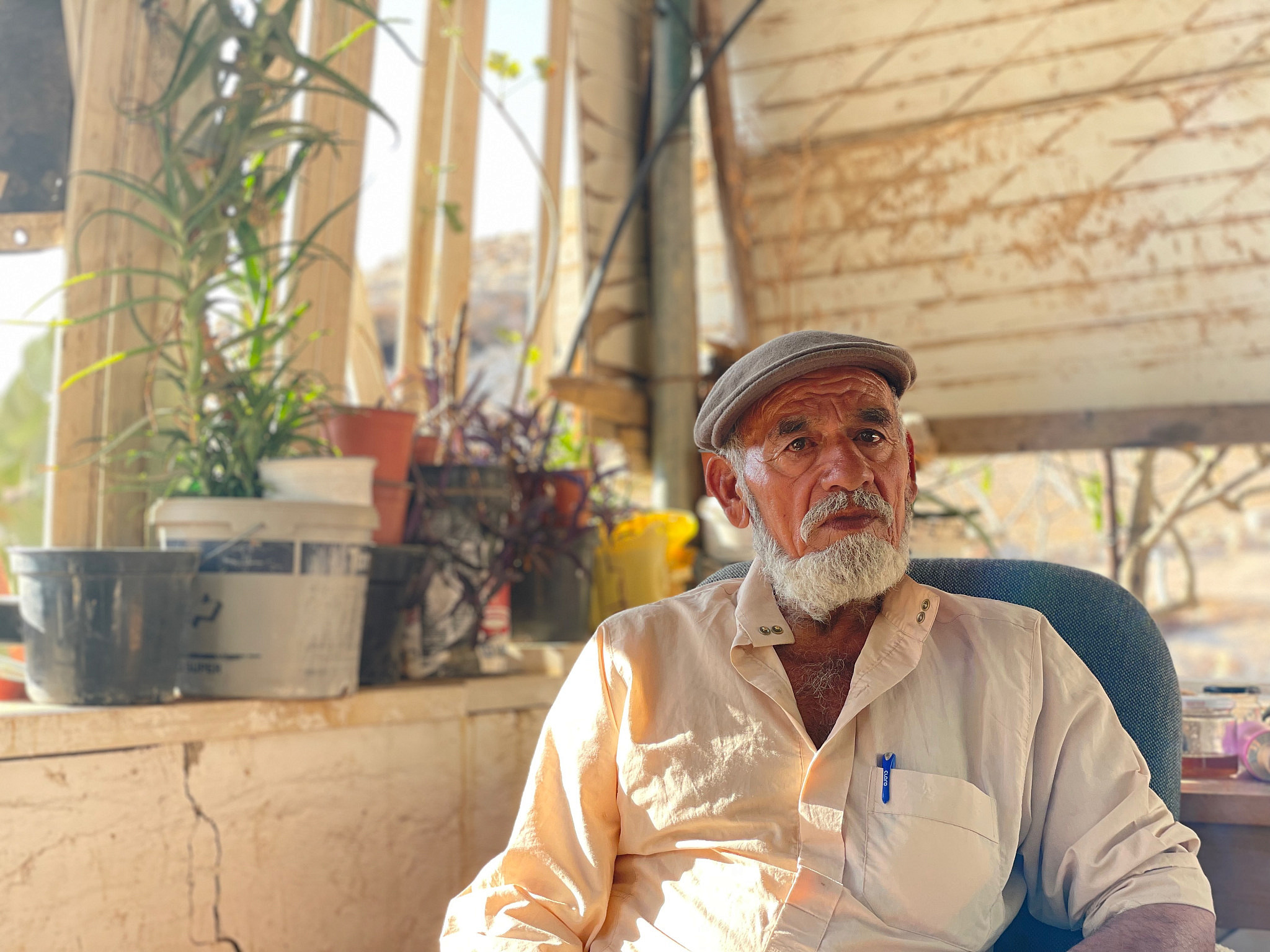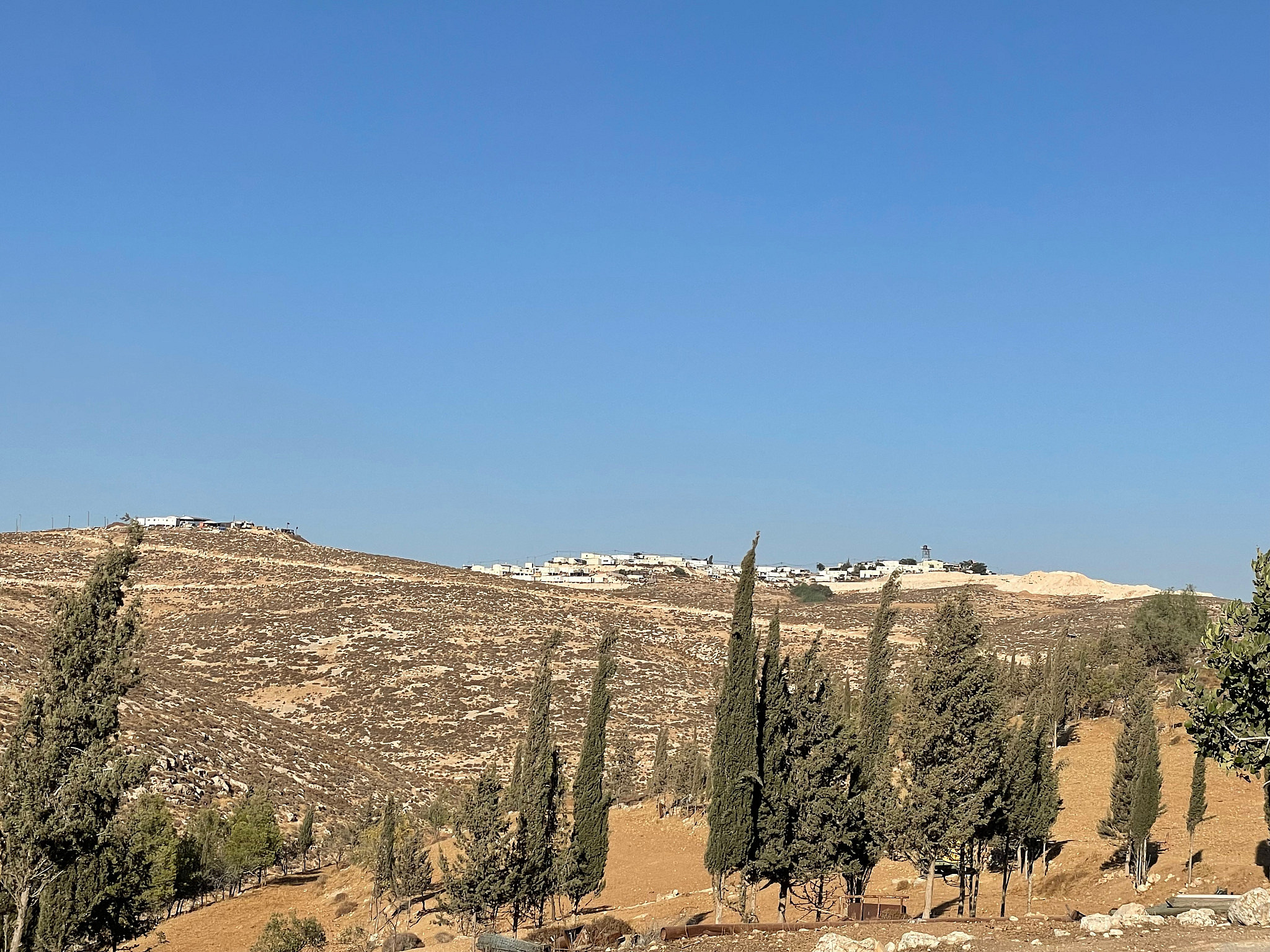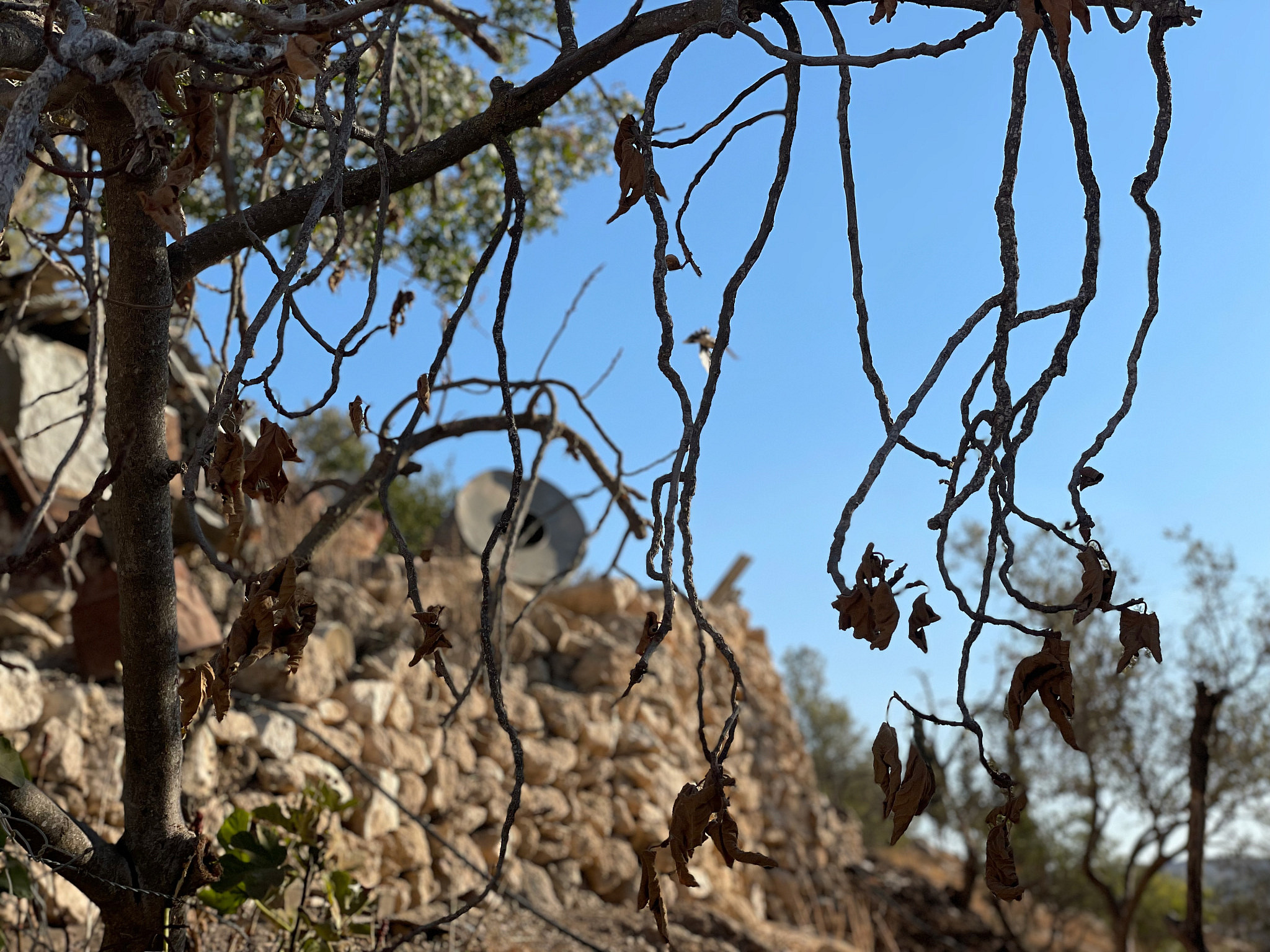Issa Abu El-Kbash, the 76-year-old patriarch of Khirbet ar-Ratheem, looked out over the valley below his home, a cement appendage protruding from the cave he was born and raised in. His land, bought by his grandfather from Ottoman landowners, sits in the hills of Masafer Yatta. With his 20 family members, Abu El-Kbash, known to many as Abu Safi, lives a modest, pastoral life. Following in the footsteps of his father and grandfather, he grew up working the land with the resources available to him — relying on the rain to grow his crops, and offering his herd the bountiful hills to feed on.
But, like many Palestinians living in Area C of the occupied West Bank, Abu El-Kbash’s way of life is under threat. At the same time that the West Bank’s climate is changing rapidly, affecting nearly every facet of life in agricultural communities, coordinated Israeli state and settler violence is exacerbating the impacts of climate breakdown, intensifying the challenges of maintaining such livelihoods in Area C. For these villages, desertification and water scarcity has become an immediate danger. And while climate change is increasingly the cause of such phenomena worldwide, in Area C, settler violence is a primary culprit.
Khirbet ar-Ratheem is situated on the West Bank’s southernmost border. Neighboring the village lies Asa’el, an Israeli settlement outpost that was legally recognized by the Israeli government last month, along with four new outposts extending from Asa’el and situated near the Meitarim Industrial Zone; one of them is a farm being erected on the hill above Abu El-Kbash’s home.
The new outposts have made daily life for the El-Kbash family near impossible. “The settlers used to stay on their small piece of land, but now, they have control over the whole area,” explained El-Kbash. “We cannot take our herds out to graze, and we can no longer reach our two [rain] water reservoirs on the hill. Even last night, some of them drove their ATVs around the village very fast, frightening my children.”
Abu El-Kbash and his family depend on having full access to their land and water reservoirs in order to sustain themselves. Now blocked by the settlers, the family is forced to purchase water from private trucks for drinking and agricultural use, spending NIS 100 (around $26) just on diesel fuel to tow the water to the village on unpaved roads. The water they purchase can cost up to 10 times what Israelis pay. Meanwhile, the new settlement farm above the village is already connected to a water network.
As Abu El-Kbash shared, shepherding in their historic grazing land is highly limited due to this settlement expansion. Much of the land was declared by Israeli authorities as “state land,” which have in recent years been allocated to settlements for development. Other areas are too risky for Palestinians to shepherd in, due to an alarming rise in settler violence.
“We did not have any crops to harvest this summer,” Issa Abu El-Kbash explained. “The settler’s herds destroyed everything. We even had a good season, but the settlers’ sheep ate and trampled it all.”
The family now needs to worry about buying food for their sheep, too. “We used to only need to supplement the herd’s food supply by purchasing feed in the winter, but now we need to do it all year,” Abu El-Kbash said. “I used to have 300 sheep and goats, but now I can only care for 50.”
With the Israeli army’s aid and protection, outposts such as those near Khirbet ar-Ratheem are being established as part of the settler movement’s strategy to drive Palestinians from their homes. Settlers bring their herds to graze on Palestinian land, while armed settlers enter villages to harass and intimidate the residents.
Heightened desertification and water insecurity
On top of state and settler efforts to force out Area C’s Palestinians, a new threat to safety and livelihoods is also emerging in the region: significant changes to the climate. The Intergovernmental Panel on Climate Change of the United Nations predicts that the southern and eastern Mediterranean region, including the West Bank, will face higher warming rates than the global average. Area C, meanwhile, is considered a hotspot within a hotspot for climate breakdown, due to the increased barriers to climate resilience posed by the Israeli occupation.
Desertification is a key indicator of climate change in the region, where vegetation in drylands decreases and eventually disappears due to climatic shifts or events, such as droughts. For pastoralists and farmers in these areas, desertification is a major threat to food security and economic livelihood. Abu El-Kbash is already seeing the impacts of desertification in his village. “Herbs and wild grains would grow everywhere, but not anymore,” he said. “We’re seeing a very big change here.”
Climate change is not the only driver of desertification. Over-exploitation of the land, particularly from overgrazing, is another key driver. With the drastic reduction in land available for Palestinian shepherds to use, due to movement restrictions from the military and settler violence, the climate-induced desertification process is being accelerated in Masafer Yatta.
The exacerbation of the crisis by state-settler violence is evident in the West Bank village of Widady. Neighboring Khirbet ar-Ratheem, Widady’s residents were forced to leave their homes earlier this summer. Unable to endure the rise in settler attacks or maintain their livelihoods in the area, the members of the small community packed up their homes in search of safety. Widady followed in the footsteps of Bir al-Eid and Khirbet Simri, two other villages in Masafer Yatta that were forced to empty last year, after countless settler attacks.
Basel Adra, a resident of Masafer Yatta and B’Tselem fieldworker (and former +972 reporter), explained that “this [displacement] is a new trend all over Masafer Yatta. When you don’t allow people to move around and meet their basic livelihood needs, they’re just going to leave.”
This phenomenon is the result of targeted Israeli policies to push Palestinians into concentrated areas — particularly cities — in Area A of the West Bank. Through systematic restrictions on construction, infrastructure development, and movement, Palestinians face demolitions, evictions, and confiscations while being effectively barred from building schools, medical facilities, and water and sanitation systems.
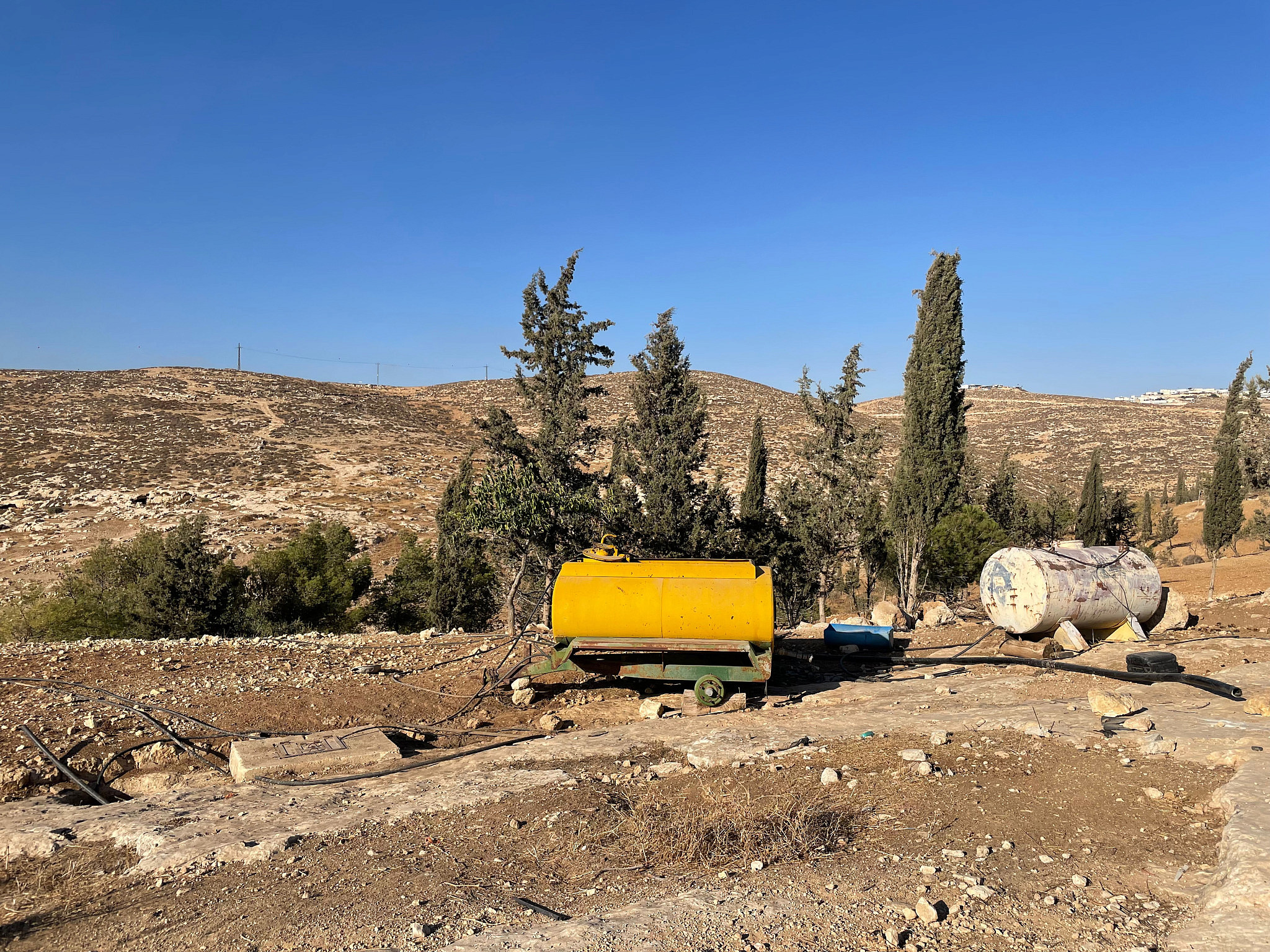
In particular, access to water remains a constant struggle for Palestinians due to Israel’s discriminatory policies on water allocation, drilling, and development of water infrastructure. Even when connected to a water network, Palestinians face water allocations limited to a few days or even hours per week, while Israeli settlers nearby are fully connected to water supplies. Many communities, like Khirbet ar-Ratheem, rely on rainwater harvesting or natural springs, but these have frequently been targeted by settler violence or taken over by outposts and settlements.
Climate change adds another layer of water insecurity in Masafer Yatta. Rising temperatures and changing precipitation patterns are already leading to reduced water availability, affecting agricultural production and access to clean drinking water. For Abu El-Kbash, whose primary water source is unreachable due to the settler takeover of his historic reservoirs, the change in water availability is having an even starker impact.
“The valley used to flood every winter,” Abu El-Kbash said. “But it hasn’t flooded for four years now.” This water supply was sufficient to grow crops year-round, but now the family is transitioning away from rainfed agriculture. “The fig tree used to give us fruit twice every year. Now look at it, it’s bare,” Abu El-Kbash said, pointing to the dry, brown skeleton of a tree outside his door. He continues to try and grow the crops and seeds that have sustained life for his village for decades, salvaging what he can amid the growing settler terror.
‘Life as a farmer could be nice. But the future is worrying’
Palestinian residents of Area C who, like Abu El-Kbash, have limited ability to access water or build infrastructure to adapt to a changing environment, are extremely vulnerable to climate breakdown. Climate change will further drive food and water insecurity for Palestinian farmers and shepherds, adding increasing pressure on top of the ongoing Israeli restrictions and settler violence threatening their day-to-day lives.
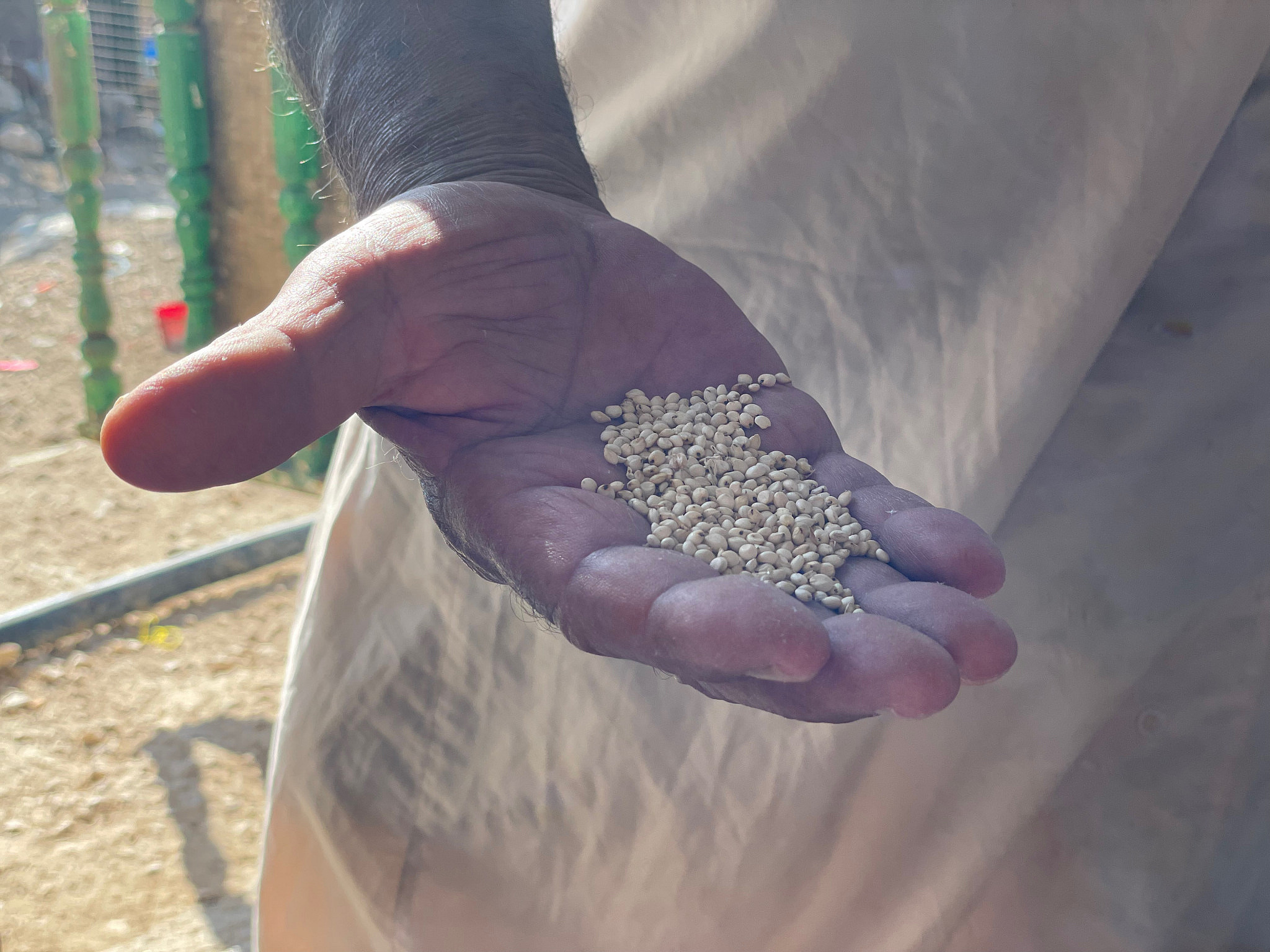
“So many families in Masafer Yatta don’t even have water to drink,” Adra said. “Without basic resources, life here is really hard.
“Life as a farmer could be really nice — the land is beautiful, you live with sheep and plants and trees,” he continued. “But the future for farmers and shepherds is very worrying, especially with the increasing pressures [from settlers] in the last few years.”
Adra reflected on how hot this past summer was in Masafer Yatta, as did Abu El-Kbash, but neither of them want to pack up and leave. Abu El-Kbash is working hard to sustain his life in the village, selling his cows and some of his herd to reduce the costs of the expensive feed he now purchases, in addition to the expensive water towing for drinking and agriculture.
Most read on +972
But the trends of this emerging reality are not hopeful for many Palestinian villages in the region. “Tha’ala and Tuba [in Masafer Yatta] cannot take their herds out at all,” Adra said. “The violence from settlers has been very bad there.”
Abu El-Kbash knows what he needs to adapt to the changing climate, as he has decades of traditional practices and knowledge of how to sustain life in this piece of land. But so long as settler violence and theft is fueling the effects of climate change, all under the permissive gaze of the Israeli government, Abu El-Kbash and others in the region will have very limited capacity to meet this emerging challenge, and we can only expect even further Palestinian displacement.

